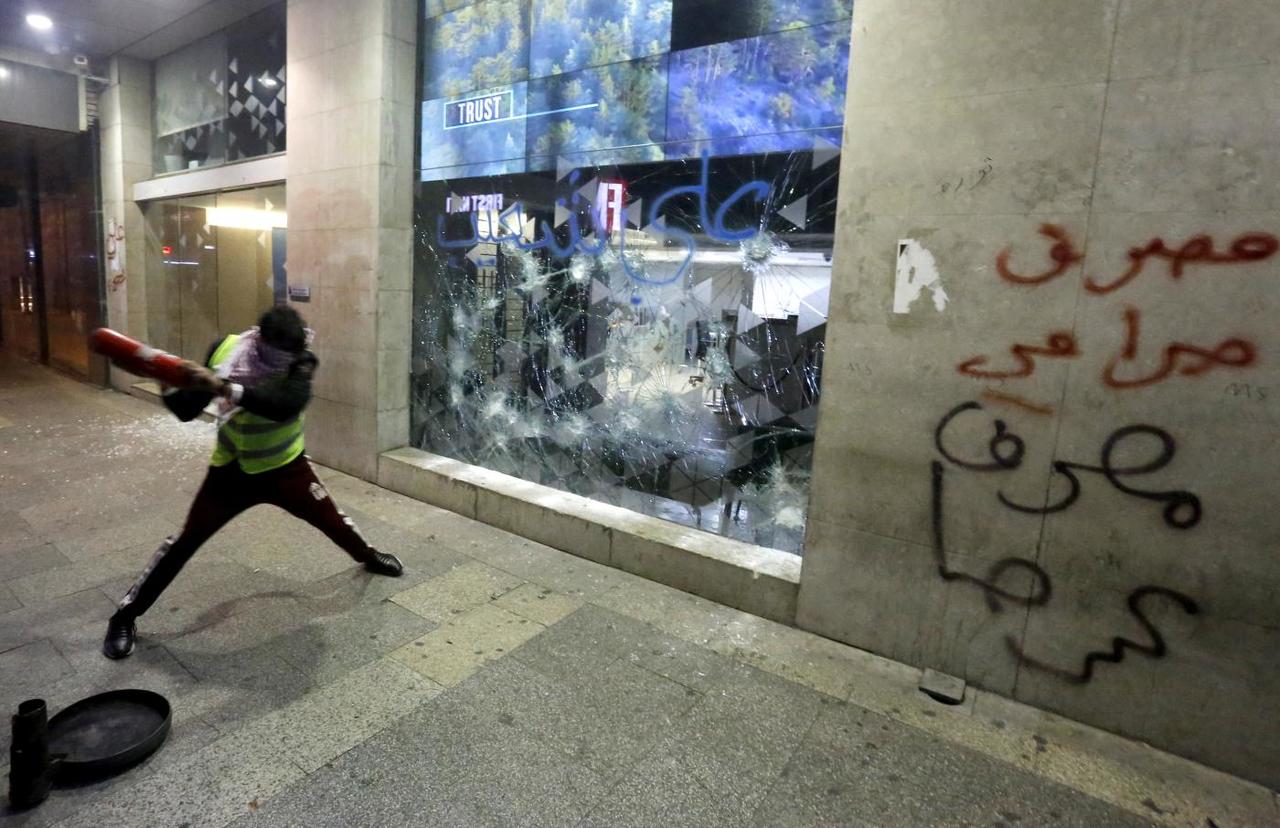Lebanese ‘Week Of Wrath’ Sees Banks Physically Attacked On Large Scale
Lebanese banks are limiting account holders to withdrawing a mere $100 of their own money at a time (and just $200 total a week) after the country’s banking crisis due to eroding liquidity and central bank’s looming default have been at the center of mass anti-corruption street protests since October of last year.
“There is a lot of anger,” one Lebanese protester told the AFP on Thursday. “You have to go to the bank twice to withdraw just $200.”
Banks and ATMs are now being targeted for vandalism and destruction by demonstrators who have declared a “week of wrath” — specifically in major cities like Beirut. It’s now been two months since commercial banks have enacted severe controls preventing large money transfers abroad and restricting clients’ access to their deposits.

These latest imposed capital controls now include limiting withdrawals to less than $200 a week, according to Lebanon’s Daily Star.
Violent clashes between mostly young protesters and policed have raged in the upscale commercial hub of Hamra district in Beirut over the last two nights. Local reports described the scene as looking like a war zone, with burning tires in debris and glass strewn streets — much of that glass from smashed bank windows.
Several bank fronts attacked by enraged protesters prevented from accessing their accounts amid a broader political and financial crisis:
The Daily Star reports the crowd attempted to storm the Central Bank building in the district:
After a month of rain, Tuesday’s protests saw the highest turnout in weeks. Following an extended stand-off in front of the headquarters of the Central Bank, protesters came into conflict with security forces that resulted in at least seven wounded.
…Several people attempted to storm the Central Bank building, breaking through the outer fence and calling for “the fall of the rule of the bank” and the resignation of Central Bank Governor Riad Salameh.
A reported 59 were arrested during the mayhem, which is likely set to continue, and has for months witnessed frustrated Lebanese physically attacking bank fronts in their efforts to get their own money out.
#Lebanon‘s protesters can no longer be called peaceful. They block vital roads & highways. They destroy bank windows & ATMs as well as throw rocks & firecrackers at security forces. And then when they get arrested, their friends are rioting in front of the police station. pic.twitter.com/oEqz78GLEN
— Walid (@walid970721) January 16, 2020
Protest leaders have consistently accused the national and commercial banks of “theft” while the bankers attempt to defend against a massive run on currency, especially the dollar.
“What happened yesterday was a response from people who are hungry, whose money is being stolen, and economic policies that have directly led us to this crisis for years now,” Ayman, a 27-year old present for the Hamra protests told the Lebanese Daily Star.
Riots in Beirut #Lebanon tonight targeting Banks and Central Bank. Financial situation in decline and state bankruptcy nears.
Here protesters downtown smashing the window of Beirut Bank. Day 90: pic.twitter.com/5cezkouQkA
— Joyce Karam (@Joyce_Karam) January 14, 2020
Adding to the the explosive situation is that Lebanon has been without a government since the prime minister resigned in late October amid protests so large (some 1 million people) that it brought the small country to a standstill.
Al Jazeera summarizes the situation as follows:
Compounding the situation, debt-burdened Lebanon has been without a government since Saad Hariri resigned as prime minister on October 29 under pressure from the anti-government protests.
Its under-fire politicians have yet to agree on a new cabinet despite the designation last month of Hassan Diab, a professor and former education minister, to replace Hariri.
Smashed Window Fronts, Destroyed ATMs, Graffiti-Covered Walls: Public Anger Against Cash-Strapped Banks Boils Over In Crisis-Hit #Lebanon Over Capital Controls That Have Trapped The Savings Of Ordinary Depositors. pic.twitter.com/GwRRUPT8Jl
— Ben Rickert (@Ben__Rickert) January 16, 2020
In some cases it appears local security forces have held back or simply ignored instances of mob destruction of bank fronts (after all, the police and their families can’t access their accounts either).
Shame shame shame #لبنان_يتنفض pic.twitter.com/HWfPxHUhNS
— Gaby Awad (@gabyawad) January 15, 2020
Meanwhile, Reuters outlines ways the country could imminently default, and possible options for barely avoiding it:
One of the possibilities to help Lebanon’s finances is to take a slice of the deposits individuals and firms hold at Lebanese banks.
The controversial measure was used in Cyprus at the height of the euro zone debt crisis. James McCormack, head of Fitch’s sovereign rating team, said that move didn’t actually trigger a default as the definition of a default is more narrowly focused on the non-payment of debt.
Though certainly the people in the streets will have something to say about taking “a slice of the deposits” held by individuals and firms.
Staying on the subject of #Lebanon‘s BoP, how is the current account deficit (25% of GDP) financed? Well, not surprisingly, the $ outflows have traditionally been covered by nonresident FX deposit inflows, portfolio inflows, and banking flows. All of which have dried up now. pic.twitter.com/jDBa04AzQG
— Nafez Zouk (@nafezouk) January 16, 2020
“One of the most heavily indebted countries in the world, Lebanon has $2.5 billion in Eurobonds due this year including a $1.2 billion bond set to mature in March,” Reuters notes.
“But its dire finances and political crisis mean it is running out of options to avoid a default.”
Tyler Durden
Thu, 01/16/2020 – 21:45
via ZeroHedge News https://ift.tt/361hF0r Tyler Durden